Video showed what appeared to be a rocket striking directly in front of an administrative building in Kharkiv, a day after Russian forces shelled the city. An unknown number of people were killed and wounded, the city’s mayor said.
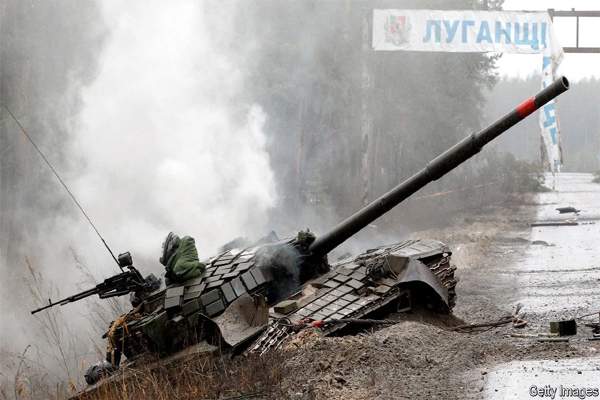
Watch Video This is an evil deed.0:280:47
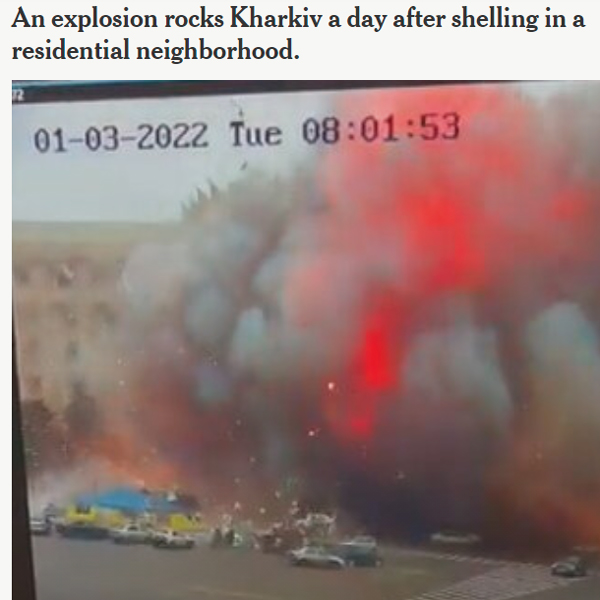
A large explosion struck central Kharkiv, Ukraine’s second largest city, on Tuesday, directly in front of the city’s administrative building, creating a huge fireball that appeared in a video to engulf several cars driving through an area called Freedom Square.
The cause of the blast and number of casualties were not immediately clear, though the city’s mayor said there were dead and wounded. CCTV footage of the attack captured what appeared to be a rocket striking directly in front of the building. Video of the aftermath showed a large crater in the middle of the city’s cobble-stoned central square.
“Barbaric Russian missile strikes on the central Freedom Square and residential districts of Kharkiv,” Ukraine’s foreign minister, Dmytro Kuleba, wrote on Twitter on Tuesday.
The blast hit around 8 a.m., about two hours after the city’s curfew had lifted, according to Anton Gerashchenko, an adviser to Ukraine’s interior minister. It appeared to damage the administrative building as well as the opera house, the philharmonic theater and a part of a large apartment block, Ukraine’s emergency services agency said in a Facebook post.
“There will come a time, when all war criminals, all insane dictators, will have to appear in court,” the agency wrote. “And at that time, Satan will curse you for each drop of blood of Ukrainian citizens that you spilled. Burn in hell for eternity.”
The explosion came a day after Russian forces shelled a residential neighborhood in Kharkiv, killing at least nine people, including a family of five who were burned alive in their car, according to the city’s mayor, Igor Terekhov.
After the capital, Kyiv, no Ukrainian city has suffered more attacks from the Russian military than Kharkiv since the invasion. But in Kharkiv, the sense of betrayal is perhaps more acute. The city of 1.5 million people is not far from the Russian border, and most residents prefer to speak Russian. When Mr. Terekhov posts daily video updates about the destruction, he speaks to his audience in Russian and at times seems on the verge of tears.
“This is not only a war, it is the murder of us, the Ukrainian people,” he said in a video on Monday after the shelling of the residential neighborhood.
Military analysts are divided over whether Russian forces hope to occupy Kharkiv or simply surround it. The goal appears to be to cut off the bulk of Ukraine’s forces, which are mostly deployed in the east, from Kharkiv as well as areas around the Sea of Azov in the south and in the Donbas region in the east, where Ukraine’s forces have been fighting Russian-backed separatists for eight years.
Until this week, Russian troops had been pounding outlying areas with artillery but had largely avoided attacking the city center. A seemingly haphazard effort by what appeared to be Russian special forces to enter central Kharkiv over the weekend was easily repelled by the Ukrainian military, which captured several Russian soldiers and their vehicles.
“They were acting like idiots,” said Robert Lee, a U.S. Marine Corps veteran and Ph.D. candidate at King’s College London who is a Russian military expert. “These were Spetsnaz,” he said, referring to Russian special forces. “These were elite forces, not random dudes. It was just kind of incomprehensible.”
Since the war began, residents of Kharkiv have been living in bomb shelters, many of them in the city’s metro stations, where trains have been parked to serve as makeshift hostels. If Russian forces expected to be greeted as liberators, as Kremlin officials insisted they would, they have been sorely mistaken.
President Vladimir V. Putin of Russia “is not only stupid — he’s a criminal,” said a woman named Svetlana who was sheltering in the University metro station over the weekend with her family and her yellow Labrador, Richard.
“Look at how people are suffering,” she said. “Children, they should be in school or the institute, and I should be at work. And we’re here, living in fear.”
Monika Pronczuk
Reporting from Brussels
President Volodymyr Zelensky of Ukraine pleaded for E.U. membership for his country in an emotional speech delivered by video to the European Parliament on Tuesday. “We have proven that at a minimum we are exactly the same as you,” he told European lawmakers. “So do prove that you are with us, do prove that you will not let us go, do prove that you indeed are Europeans. And then life will win over death and light will win over darkness. Glory be to Ukraine.”


Austin Ramzy
Reporting from Hong Kong
Stocks in Europe fell on Tuesday, investors rushed to buy bonds and oil prices moved higher, back above $100 a barrel as sanctions against Russia continue to tighten. Amid fears of rising inflation and supply chain issues, futures on Wall Street pointed to a drop when trading starts.
Haley Willis and Ainara Tiefenthäler
Videos show Russian military vehicles and foot soldiers patrolling a strategic city in southern Ukraine.
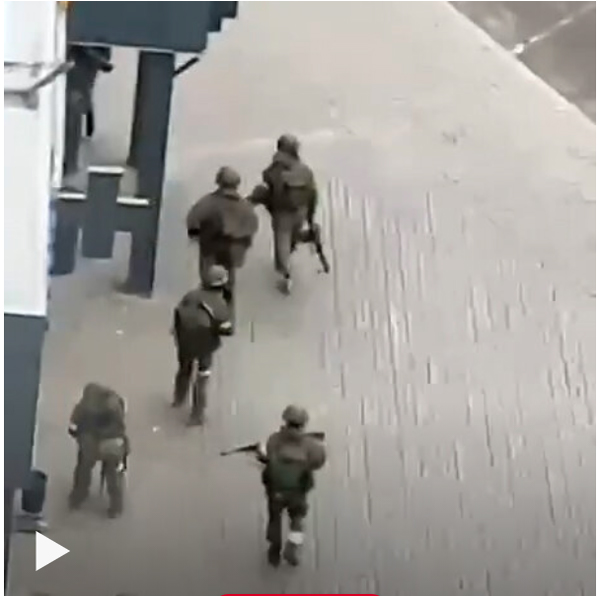
Video posted to the Telegram messaging platform on Tuesday, and verified by The New York Times, shows an attack on apartment buildings in Kherson, a city that has been a target of Russia’s assault into southern Ukraine. The apartments are next to a kindergarten.
Another video captures Russian military vehicles near a central roundabout in the city. Other footage, filmed a few miles away, shows Russian foot soldiers patrolling the streets.
Ukraine’s emergency services agency said on its Facebook page that two residential buildings in Kherson had been damaged by projectiles, causing injuries to four people. The casualty figures could not be independently verified.
Kherson’s mayor, Igor Kolykhaev, wrote on Tuesday morning that Kherson was “still Ukraine” and that Russian forces had not captured the city.Show more
The New York Times
Voices from Ukraine: ‘The Daily’ hears from men facing a call to fight.
As the Russian assault has intensified, Ukraine’s government has enacted martial law, requiring men to stay in the country and either join the fight or face the prospect of conscription.
A new episode of “The Daily” podcast tells the story of three of those men: Eugene, an I.T. worker from the northeastern city of Kharkiv; Tigran, an animator who tried to cross the border into Poland; and Andrew, who signed up for the territorial defense force two weeks ago.
This episode contains strong language.
As hundreds of thousands of citizens flee the Russian advance, the country’s government has ordered men ages 18 to 60 to remain.Listen 42:41Show more
Isabella Kwai
Reporting from London
Prime Minister Boris Johnson said that Britain would give Ukrainians its support, calling President Vladimir V. Putin of Russia’s tactics “barbaric.” Mr. Johnson also said that his government would make it easier for Ukrainians in Britain to bring family members there, estimating that they could number “more than 200,000.” Opposition lawmakers and rights groups have criticized the government for not waiving visas for Ukrainians

Amy Qin
Reporting from Taipei, Taiwan
Taiwan’s interior minister said on Tuesday that the government would allow Ukrainians to extend their stays on the island and that there would be no limits on the number of extensions granted, according to Taiwan’s official Central News Agency. Over the weekend, buildings around Taiwan, including the iconic Taipei 101 skyscraper, were lit with the blue and yellow of the Ukrainian flag in a show of solidarity.

Stanley Reed
Reporting from London
TotalEnergies, the French oil company with large natural gas investments in Russia, said on Tuesday that it would no longer provide capital for new projects in the country, in reaction to the invasion of Ukraine. But its announcement stopped short of following BP, Shell and Equinor, which said in recent days that they would exit their Russian investments. “TotalEnergies condemns Russia’s military aggression against Ukraine, which has tragic consequences for the population and threatens Europe,” said the company, which has played a key role in developing Russia’s capabilities in liquefied natural gas.


John Yoon
Britain’s Defense Ministry said that Russian forces had made little progress on their advance on Kyiv in the past 24 hours because of “logistical difficulties” and that they had increased their use of artillery near Kyiv, Kharkiv and Chernihiv, increasing the risk of civilian casualties. Britain has significant intelligence in the region.
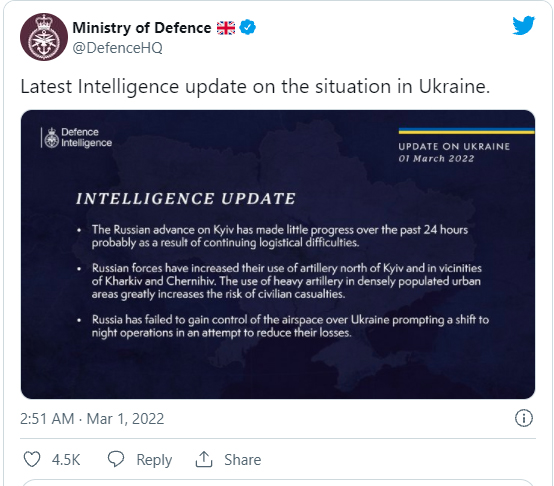

Mike Ives
Reporting from Seoul
In a bid to bolster morale, Ukraine’s foreign ministry released a video on Tuesday of children in a bunker in Kyiv singing the city’s anthem.
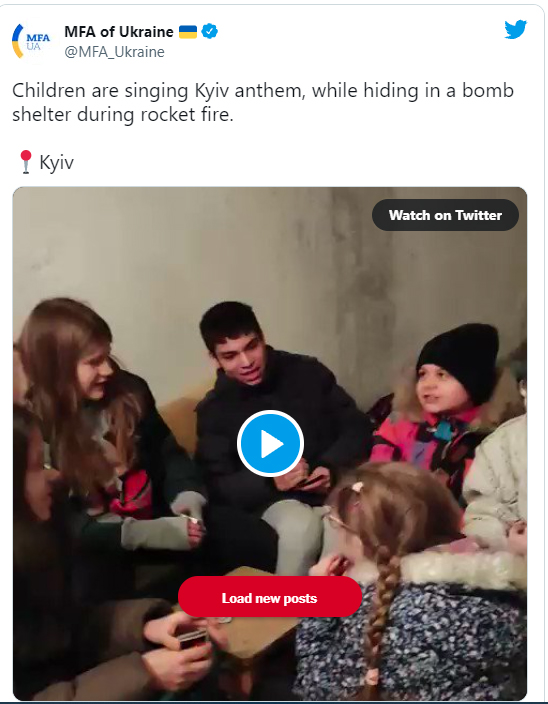
 3 hours ago
3 hours ago
Choe Sang-Hun
Reporting from Seoul
South Korea said it was banning financial transactions with Sberbank, VEB and five other major Russian banks and their affiliates. Its finance ministry also “strongly” urged South Korea’s public and financial institutions to suspend any trading of Russian treasury bonds to be issued from Wednesday. South Korea had earlier said it supported the move to ban major Russian banks from the SWIFT system.3 hours ago
Valery Gergiev, a Putin ally, is fired as chief conductor of the Munich Philharmonic.

He led the London Symphony Orchestra in New York in 2015. (Hiroyuki Ito for The New York Times)
Valery Gergiev, the star Russian maestro and prominent supporter of President Vladimir V. Putin of Russia, was removed Tuesday from his post as chief conductor of the Munich Philharmonic after he refused to denounce Mr. Putin’s invasion of Ukraine.
And Anna Netrebko, the Russian diva who is one of opera’s biggest international stars, saw her upcoming engagements with the Bavarian State Opera canceled, and the Zurich Opera House announced that she had withdrawn from her upcoming performances there. She too has ties to Mr. Putin, and was once pictured holding a flag used by some Russian-backed separatist groups in Ukraine.
Dieter Reiter, the mayor of Munich, announced his decision about Mr. Gergiev and the Munich Philharmonic in a news release saying that terminating the contract was the only option available.
Mr. Gergiev’s abrupt dismissal, three years before his contract was set to expire, was the biggest setback yet for the conductor, who has been the target of widespread anger and condemnation in recent days for his long record of support for Mr. Putin and his policies.
Officials in Munich said that Mr. Gergiev, who had held the post of chief conductor since 2015, had failed to respond to a demand issued on Friday by Mr. Reiter that he condemn Mr. Putin’s “brutal war of aggression” by Monday or be fired.
The news release said that “with immediate effect, there will be no further concerts by the Munich Philharmonic” under Mr. Gergiev’s baton.
Mr. Reiter said in his statement that “I would have expected him to reconsider and revise his very positive assessment of Russia’s leader. He didn’t.” Termination was the only option, the statement added.
Mr. Gergiev did not immediately respond to a request for comment on Tuesday.
The conductor, who is one of Russia’s most prominent cultural ambassadors, has faced the loss of concerts and tours around the world since the start of Mr. Putin’s invasion on Thursday, which prompted a long list of performing arts institutions to sever ties with him. But the loss of his leadership position at the helm of a major European orchestra suggested much more serious ramifications for his international career.
It is a stunning turnaround for Mr. Gergiev, whose packed schedule and regular engagements with many of the world’s leading concert halls and opera houses has led the website Bachtrack, which collect statistics on classical music performances, to proclaim him the world’s busiest conductor in several recent seasons.

the Munich Philharmonic at Carnegie Hall shortly before he became the orchestra’s chief conductor. (Ruth Fremson/The New York Times)
Mr. Gergiev is a prominent supporter of Mr. Putin, endorsing his re-election and appearing at concerts in Russia and abroad to promote his policies. The two have known each other since the early 1990s, when Mr. Putin was an official in St. Petersburg and Mr. Gergiev was beginning his tenure as the leader of the Mariinsky, then called the Kirov.
Mr. Putin has played an important role in Mr. Gergiev’s success, providing funding to the Mariinsky Theater, where Mr. Gergiev serves as general and artistic director.
His international engagements began drying up last week, when Carnegie Hall and the Vienna Philharmonic dropped him from a series of performances. On Sunday, Mr. Gergiev’s manager announced he was ending his relationship with his client.
The manager, Marcus Felsner, said in a statement that it had become impossible to defend Mr. Gergiev, whom he described as “one of the greatest conductors of all time, a visionary artist loved and admired by many of us, who will not, or cannot, publicly end his long-expressed support for a regime that has come to commit such crimes.”
On Monday, the fallout continued, with the Verbier Festival in Switzerland saying it had asked for and accepted the resignation of Mr. Gergiev as music director of the festival’s orchestra. (The festival also said it would ban other artists who had shown support for Mr. Putin’s actions, and that it would return donations from individuals under sanctions from Western governments.)
The Edinburgh International Festival in Scotland, where Mr. Gergiev served as honorary president, also said Monday that he had resigned his position after being asked to do so. Philharmonie de Paris, a performing arts complex in France, announced it was canceling two concerts in April with Mr. Gergiev and the Mariinsky Orchestra. And the Lucerne Festival in Switzerland said it was canceling two performances in August with Mr. Gergiev and the Mariinsky.
“In view of Russia’s acts of war in violation of international law, we are sending a clear signal of solidarity to the people of Ukraine,” Michael Haefliger, the festival’s executive and artistic director, said in a statement.
Shortly after the mayor of Munich announced his decision on Tuesday, a spokesman for the Elbphilharmonie in Hamburg, Germany — another major concert hall — said it, too, had canceled Mr. Gergiev’s future engagements. Several other institutions are considering similar moves, including the Rotterdam Philharmonic Orchestra and Teatro alla Scala, in Milan.
Alex Marshall contributed reporting.

Choe Sang-Hun}
Reporting from Seoul
Lee Young-ae, a South Korean actress popular in Ukraine, donated 100 million won ($83,500) to help the victims of war there, Dmytro Ponomarenko, the Ukrainian ambassador-designate to Seoul, said on Twitter.
Ms. Lee, who played a super-star role in the South Korean TV series ”Dae Jang Geum,” or “Jewel in the Palace,” helped spread South Korean entertainment through Asia to Eastern Europe. In a letter to Mr. Ponomarenko, she said she shared the pain of the “horror of war” and hoped that “the Ukrainian people will not lose hope and courage.
”
Valerie Hopkins, Andrew E. Kramer, Marc Santora and Michael Schwirtz
Zelensky accuses Russia of war crimes as Kyiv braces for a renewed assault.
KYIV — As President Volodymyr Zelensky of Ukraine accused Russia of war crimes for deliberately targeting civilians in its unrelenting bombardment of his country, a huge convoy of Russian tanks and mechanized vehicles — stretching some 40 miles in length — massed menacingly just north of Kyiv on Tuesday morning.
With Russian soldiers facing stiff resistance from the Ukrainian Army and confronting millions of furious Ukrainian citizens across the nation, Western officials warned that President Vladimir V. Putin might turn to even more powerful weapons to force his will on Ukraine.
Russian forces have already begun to employ siege tactics in their bid to take control of Ukraine’s second-largest city, Kharkiv. Monday’s bombardment, the most destructive of the war, signaled a potential turn in the biggest military mobilization in Europe since World War II.
“Today showed that this is not only a war, it is the murder of us, the Ukrainian people,” Kharkiv’s mayor, Igor Terekhov, said in a video posted on Facebook. On Tuesday morning, a huge explosion was reported directly in front of the city’s administrative building.
As Mr. Putin’s forces struggle to encircle and subdue the nation’s capital, Kyiv, there is a growing concern that he may step up his bombardment of the city to break the public’s resolve.
On Tuesday morning, the Ukrainian military said it continued to have control over the outer borders of the city and was preventing Russian units from approaching the suburbs of the capital.
The military warned that Russian agents were dressing in Ukrainian military and police uniforms in an attempt to penetrate Kyiv. It also said that Russia was employing agents to sabotage and attack civilian and military infrastructure.
Overnight, many of Kyiv’s 2.8 million inhabitants huddled in bomb shelters as air raid sirens wailed through the darkness. In a bid to bolster morale, Ukraine’s foreign ministry released a video on Tuesday morning of children in a bunker singing the city’s anthem.
Mr. Zelensky said that 16 Ukrainian children had died as a result of the Russian shelling over the first four days of fighting, and on Tuesday there were more reports of hospitals and other civilian structures damaged or destroyed by Russian forces.
“Today, Russian troops shelled Kharkiv using rocket artillery,” Mr. Zelensky said in a video posted on his Facebook page late on Monday. “This is, without any doubt, a military crime. A peaceful city. Peaceful residential neighborhoods. Not a single military object in sight.”
Moscow is also facing increasingly vigorous global opposition, from both national governments and multinational corporations.
The ruble has cratered, losing a quarter of its value, and Russia’s central bank shuttered stock trading in Moscow through Tuesday. Aeroflot, the national airline, canceled all its flights to Europe after countries banned Russian planes from using their air space.
Mastercard has blocked multiple financial institution from its payment network, and Shell, Volvlo and Mercedes-Benz all took steps to cut ties with Russian business partners.
As Russians deal with the economic fallout of their country’s war, an increasingly desperate race to flee the fighting has led some 500,000 Ukrainians to seek safety in European Union member states that border Ukraine.
Many others have stayed to fight and have proven essential in helping an outgunned army frustrate the Russian war plans. But Western military analysts say that Mr. Putin has yet to unleash the full ferocity of the arsenal at his disposal.

Adam Satariano
Reporting from London
YouTube said it would block channels connected to RT and Sputnik across Europe, effective immediately. Meta, the parent company of Facebook, made a similar move on Monday
Safak Timur
Reporting from Istanbul
Turkey will continue its efforts “to stop the war and provide peace” between Ukraine and Russia, President Recep Tayyip Erdogan told President Alexander G. Lukashenko of Belarus in a phone call, Mr. Erdogan’s office said in the early hours of Tuesday
.
Yan Zhuang
Reporting from Melbourne, Australia
Australia will commit $50 million to Ukraine in lethal and nonlethal military support, in partnership with NATO, Prime Minister Scott Morrison announced on Tuesday. The “overwhelming majority” of that money will be used for lethal support, he said. “We are talking missiles, ammunition, we are talking supporting them in their defense of their own homeland,” he said.

 5 hours ago
5 hours ago
Austin Ramzy
Reporting from Hong Kong
Michael Schwirtz
Reporting from Ukraine
An enormous explosion hit central Kharkiv on Tuesday morning, directly in front of a government building in Ukraine’s second largest city, Ukraine’s Interior Ministry said, creating a large fireball that appeared in a video to engulf several cars driving through the area.
The blast hit at about 8 a.m., two hours after the city’s curfew had lifted, according to Anton Gerashchenko, an advisor to Ukraine’s interior minister. It was not immediately clear if there were any injuries or what caused the blast. Video of the aftermath showed a large crater in the middle of the city’s cobblestoned central square. The explosion comes a day after Russian forces shelled a residential neighborhood in Kharkiv, killing at least nine people, including a family of five, who were burned alive in their car, according to the city’s mayor, Igor Terekhov
.
Adam Satariano and Sheera Frenkel
The war is testing the power of tech giants.

(Sergey Ponomarev for The New York Times)
Russia’s invasion of Ukraine has become a defining geopolitical moment for some of the world’s biggest tech companies as their platforms have turned into major battlefields for a parallel information war and their data and services have become vital links in the conflict.
Over the last few days, Google, Meta, Twitter, Telegram and others have been forced to grapple with how to wield that power, caught between escalating demands by Ukrainian, Russian, European Union and U.S. officials.
On Friday, Ukrainian leaders pleaded with Apple, Meta and Google to restrict their services inside Russia. Then Google and Meta, which owns Facebook, barred Russia’s state-run news media from selling ads on their platforms. Sundar Pichai, Google’s chief executive, also spoke with top European Union officials over how to counter Russian disinformation.
At the same time, Telegram, a widely used messaging app in Russia and Ukraine, threatened to shut down channels related to the war because of rampant misinformation. And on Monday, Twitter said it would label all posts containing links to Russian state-affiliated media outlets, and Meta said it would restrict access to some of those outlets across the European Union to ward off war propaganda.
For many of the companies, including Facebook, Google and Twitter, the war is an opportunity to rehabilitate their reputations after facing questions in recent years over privacy, market dominance and how they spread toxic and divisive content. They have a chance to show they can use their technology for good in a way not seen since the Arab Spring in 2011, when social media connected activists and was cheered as an instrument for democracy.
But the tech companies face tricky decisions. Any missteps could be costly, adding more momentum to efforts in Europe and the United States to regulate their businesses or leading Russia to ban them altogether.Show more
6 hours ago
At least 411 people are detained across Russia as antiwar protests continue.

C(Sergey Ponomarev for The New York Times)
As antiwar protests continued across Russia, the police detained at least 411 people in 13 cities on Monday, an activist group said. The group, OVD-Info, said there had been at least 6,435 detentions in Russia since the invasion of Ukraine on Feb. 24.
The protests are a remarkable display of defiance in a country where prosecutors sometimes seek prison sentences for demonstrators. Early last year, there were nationwide demonstrations in the days after the Russian authorities arrested the opposition leader Aleksei A. Navalny. Those rallies were the most widespread in Russia since at least 2017, when thousands of citizens gathered in more than 100 cities to protest corruption.
Monday’s unrest unfolded amid growing public alarm in Russia over how sanctions imposed by the West in retaliation for the invasion would affect the country’s financial stability. As the currency cratered, some people rushed to withdraw cash from A.T.M.s.

Livia Albeck-Ripka
Prime Minister Jacinda Ardern of New Zealand has condemned Russia’s attack on Ukraine as “unprovoked and unjustified,” describing Vladimir V. Putin’s actions as those of a bully. Speaking to Parliament on Tuesday, Ms. Ardern called for Russia’s immediate withdrawal from Ukraine and for an end to the “pointless war.”

Yu Young Jin
Reporting from Seoul
The South Korean government will donate $10 million worth of humanitarian aid to the Ukrainian government and refugees. According to a statement from the Ministry of Foreign Affairs, the South Korean government plans to “actively contribute to resolving the humanitarian crisis in Ukraine.
Satellite internet terminals, sent by Elon Musk, arrive in Ukraine.

(Craig Bailey/Florida Today, via Associated Press)
Ukraine’s vice prime minister said on Monday that internet terminals sent by Elon Musk, which were designed to work with satellites orbiting in space to provide online access, had arrived in the country.
One of Mr. Musk’s companies, SpaceX, has deployed thousands of satellites into low-Earth orbit over the past three years as part of its business to beam high-speed internet service from more than 100 miles above the planet.
Satellite internet services like Mr. Musk’s, which is known as Starlink, can be useful in parts of the world where people cannot easily access conventional internet providers, whether because of technical limitations, government restrictions or other barriers.
There have been a number of internet disruptions in Ukraine since the Russian invasion began last week. On Saturday, Vice Prime Minister Mykhailo Fedorov of Ukraine, who is also the minister of digital transformation, wrote to Mr. Musk on Twitter to ask for Starlink stations.
“While you try to colonize Mars — Russia try to occupy Ukraine!” Mr. Fedorov wrote. “While your rockets successfully land from space — Russian rockets attack Ukrainian civil people!”
Mr. Musk, a billionaire entrepreneur who is also the chief executive of the electric-car maker Tesla, said that the Starlink service was now active in Ukraine and that he was sending more of the terminals users would need to access a satellite internet signal through the system.
Mr. Fedorov posted a photo on Twitter on Monday that appeared to show a military truck loaded with Starlink terminals.
“Starlink — here,” he wrote, and thanked Mr. Musk.
“You are most welcome,” Mr. Musk wrote back.
It was unclear as of early Tuesday how many Starlink terminals had arrived in the country, where they would be available or who would be allowed to use them. SpaceX did not immediately respond to a request for comment.Show more
The global repudiation of Russia echoes the Cold War.

(Sergey Ponomarev for The New York Times)
In Switzerland, the Lucerne music festival canceled two symphony concerts featuring a Russian maestro. In Australia, the national swim team said it would boycott a world championship meet in Russia. At the Magic Mountain Ski Area in Vermont, a bartender poured bottles of Stolichnaya vodka down the drain.
From culture to commerce, sports to travel, the world is shunning Russia in myriad ways to protest President Vladimir V. Putin’s invasion of Ukraine. Not since the frigid days of the Cold War have so many doors closed on Russia and its people — a worldwide repudiation driven as much by the impulse to show solidarity with besieged Ukrainians as by any hope that it will force Mr. Putin to pull back his troops.
The boycotts and cancellations are piling up in parallel with the sanctions imposed by the United States, Europe, and other powers. Although these grass-roots gestures inflict less harm on Russia’s economy than sweeping restrictions on Russian banks or the mothballing of a natural gas pipeline, they carry a potent symbolic punch, leaving millions of ordinary Russians isolated in an interconnected world.

John Yoon
Some cryptocurrency exchanges said they were refusing calls to suspend Russian accounts. Unless there was a legal requirement to do so, the move would violate bitcoin’s “libertarian values, which strongly favor individualism and human rights,” Jesse Powell, the chief executive and co-founder of the U.S.-based Kraken Exchange, said on Twitter. “Our mission,” he added, “is to bridge individual humans out of the legacy financial system and bring them in to the world of crypto, where arbitrary lines on maps no longer matter.” On Sunday, Mykhailo Fedorov, Ukraine’s minister of digital transformation, had asked all major crypto exchanges to block Russian addresses.

Austin Ramzy
Reporting from Hong Kong
Markets in the Asia Pacific region opened mostly higher on Tuesday after a day of turbulence over the crisis in Ukraine. Japan’s Nikkei 225 climbed by 1.5 percent by midday, while the S&P/ASX 200 in Australia was up by 0.9 percent. The Hang Seng index in Hong Kong was down by less than 0.1 percent, while in mainland China the Shanghai composite index climbed by 0.3 percent and Shenzhen component fell by 0.2 percent.
Anton Troianovski and Ivan Nechepurenko
As sanctions batter their economy, Russians face the anxieties of a costly war.

For two decades under President Vladimir V. Putin, Russians reaped the bounties of capitalism and globalization: cheap flights, affordable mortgages, a plethora of imported gadgets and cars.
On Monday, those perks of modern life were abruptly disappearing, replaced by a crush of anxiety as sanctions imposed by the West in retaliation for Moscow’s invasion of Ukraine rattled the foundations of Russia’s financial system.
The ruble cratered, losing a quarter of its value, and the central bank shuttered stock trading in Moscow through Tuesday. The public rushed to withdraw cash from A.T.M.s, and Aeroflot, the national airline, canceled all its flights to Europe after countries banned Russian planes from using their air space. Concern about travel was so great that some people rushed to book seats on the few international flights still operating.
Compounding the pain was the decision by Western countries to restrict the Russian Central Bank’s access to much of its $643 billion in foreign currency reserves, undoing some of the Kremlin’s careful efforts to soften the impact of potential sanctions and making it difficult for the bank to prop up the ruble.
Other moves struck at the heart of critical Russian industries. Shell, a company that for years helped Russia profit from its energy riches, said it was exiting all its joint ventures with Gazprom, Russia’s largest state-owned natural gas company — following BP’s announcement Sunday it would sell its stake in the Russian state-run oil giant Rosneft. Volvo said it would stop production at its truck factory in Russia, and Mercedes-Benz said it would drop its partnership with a Russian truck maker.
And in a sign of how the sanctions were hitting regular Russians in ways big and small, Apple Pay and Google Pay stopped working at many of Moscow’s subway turnstiles — the ones operated by a bank on the American sanctions list.
NYTimes 03 01 2022











